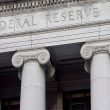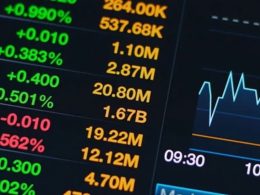An Austrian View of the VIX
by Martin Sibileau, A View From the Trenches
A corollary of this Austrian view of the VIX is that under a system with simultaneously a gold standard (i.e. commodity backed currency) AND a 100% reserve requirement (i.e. no credit multiplier), the weight of implied correlations in the determination of a forward looking implied volatility index should be irrelevant.
The collapsing CBOE Volatility Index (VIX) and its implication that it is now safe to dive into equities has received much attention in the press (see here and here). Today, I want to briefly discuss what this index represents and implies
What is the VIX?
The VIX is a forward looking implied volatility index calculated by the Chicago Board Options Exchange (“CBOE”). The index is constructed by creating a ‘synthetic option’ based on prices paid for puts and calls on the S&P 500 on any given day. More plainly, the VIX is an attempt to measure future volatility (implied volatility) based on how much the market is willing to pay today for put and call options.
Option premiums are priced using the Black Scholes pricing formula, which ironically, was invented by the fine folks who brought you Long Term Capital Management. The formula assumes that:
a) Price volatility follows a normal distribution (i.e. price changes are of a continuous nature and about 95% of the values lie within two standard deviations), and
b) There is a risk free-rate of return.
Trading of options tends to focus on volatility expectations. Should market participants think volatility will be higher in the future, they will bid up the price of the index options, or the reverse, if they think volatility will be lower in the future. The VIX therefore follows the implied volatility of S&P 500 options.
A word of caution
A factor often overlooked on the VIX is the correlation of price returns among the constituents (stocks of the S&P500 index) of the index. Correlation has a relevant impact on the VIX, because in a world of fiat money and aggregate leverage (i.e. banks do not have a 100% reserve requirement):
a) In a rush for liquidity (i.e. everyone is looking for the exits at the same time) all stocks are sold regardless of relative fundamentals, and
b) When liquidity is injected by central banks, stocks rise in tandem, regardless of relative fundamentals
Therefore, implied correlations are significantly driven by the liquidity policies of central banks. When liquidity evaporates, correlation pushes the VIX more than implied by the underlying component volatilities.
An “Austrian” view
Should we care about implied volatility when the future is unknowable? Can we assume a normal distribution to discount the probability of rare events? Can we not have a sound theory to understand an economic system, rather than rely on implied volatilities and correlations?
In his book, The Black Swan, Nassim Taleb likens statistical forecasting of human action to the life of a turkey:
As a young turkey is growing up, he is fed a plentiful amount of grain each day from the loving farmer. Weeks and months go by and the turkey continues to be well taken care of. He develops a love for the farmer and is convinced with strong statistical significance that tomorrow will be just as lovely as today. The trouble is that one day, the turkey wakes up and it’s Thanksgiving and the loving farmer “brings the turkey to market” so to speak.
Taleb’ s example should elucidate that with human action, statistical prediction is paradoxical. In the same fashion, to guide one’s views on a low VIX fundamentally ignores the reality that liquidity conditions are prone to sudden violent changes, which will impact correlations.
As I elaborated more than a year ago (here, here and here), when the Fed extends US dollar currency swaps (even if they are not used) or when the Swiss National Bank pegged its currency to the Euro, their balance sheet are coupled to those of other central banks. This coupling weakens correlations across and within asset classes, as liquidity is injected. The compression in the VIX, in my opinion, has been driven by monetary policy, rather than a genuine recovery in productivity/equity valuations.
In a recent note by Barclays’ US Equity Derivatives Strategy team ( see “A small kink in the volatility term structure”, Index Volatility Weekly, January 14th, 2013), the authors suggest that since “…stock implied volatilities are already at their 2006 levels, a further decline in VIX should have to be driven by a decline in implied correlations…”. My guess is that we will not get to that decline as long as the Euro zone remains “breakable”. This would be consistent with my Austrian view on the VIX and a test of this view would be the reaction in implied correlations to an improvement in the Target 2 balances or an advance towards a banking union. If any or both of these issues show a resolution, the implied correlations and the VIX will still have room to get lower, with a Euro at obscenely higher levels. Finally, I am not convinced that there can be a clear impact on correlations from the ongoing global currency wars. One can argue either way that the wars can increase (i.e. liquidity is injected) or decrease (cooperation among central banks risk breaking up) correlations.
Corollary
A corollary of this Austrian view of the VIX is that under a system with simultaneously a gold standard (i.e. commodity backed currency) AND a 100% reserve requirement (i.e. no credit multiplier), the weight of implied correlations in the determination of a forward looking implied volatility index should be irrelevant. There would be no reason to think that the relative volatility of the index constituents should be correlated. And just like Fermat found the margin of his copy of Diophantus’ Arithmetica too small, I too don’t find enough space in this article to include “the truly remarkable proof” of this corollary.
Martin Sibileau
Copyright © A View From the Trenches













